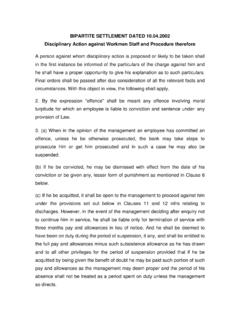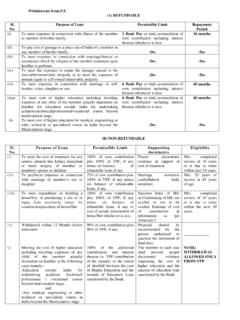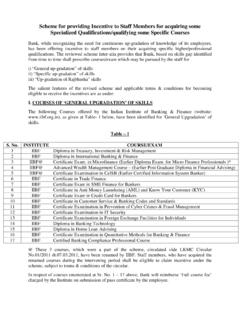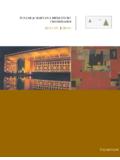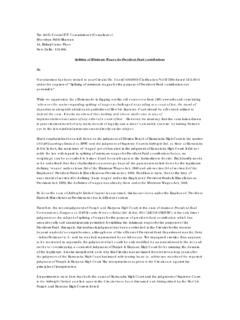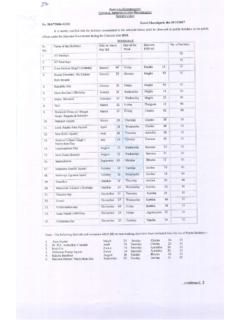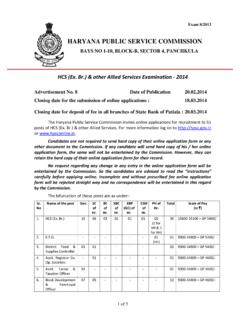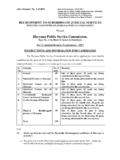Transcription of Selected Case Laws - aipnbsf.org
1 Selected case laws . In the case of Associated Cement Co. Ltd. V Workmen, (1963 IILLJ 396. SC) the Supreme court laid down the following rules of evidence directing that violation of the said rules shall render the enquiry unfair and vitiated. (a) When the defence taken by the workman and his witnesses is inconsistent with some circumstance or documentary evidence of record, they should be asked to explain the apparent inconsistency and their defence should not be rejected on the ground of inconsistency. (b) Any evidence given by the witnesses in some other proceedings is inadmissible. If that evidence is to be used, the workman must be given an opportunity to cross examine them. In the case of State of Haryana and another V Rattan Singh (1982 ILLJ. 46 SC), the bench of three judges of the Supreme court held that It is well settled that in a domestic enquiry, strict and sophisticated rules of evidence under the Evidence Act may not apply.
2 All materials which are logically probative for a prudent mind are permissible. There is no allergy to hearsay evidence provided; it has reasonable nexus and credibility. It is true that departmental authorities and administrative tribunals must be careful in evaluating such materials and should not glibly rely on what is strictly speaking not relevant under the Indian Evidence Act. The essentials of judicial approach are objectivity, exclusion of extraneous matters of considerations and observance of rules of natural justice. Of course fair play is the basis and if perversity of arbitrariness, bias or surrender of independence of judgment, vitiate the conclusions reached, such finding even though of a domestic tribunal cannot be held good. There is a clear violation of the cannons of fair play and natural justice if the enquiry officer takes on the role of a witness in addition to his own and gives evidence as a witness and then takes over against as the enquiry officer.
3 Such an illegality vitiates the enquiry and renders the order of dismissal bad in law - Andhra Scientific Co. Ltd. V. Seshagiri Rao (1951 IILLJ 117 SC). In Ramlal V. Union of India (AIR 1962 Raj 57), the watchman Ramlal, in reply to the charge-sheet craved mercy on the ground that this was the first occurrence during his service for eleven years, pointing out at the same time the difficulties of a watchman escorting the train at night in detecting a preplanned theft of goods carried by rail on the track. He was dismissed from service without formal enquiry on the ground that it was admission of guilt with a conditional apology. Their Lordships set aside the order of dismissal observing that when it was Not a clear and unambiguous admission of guilt, the employer should have held a formal enquiry, before dismissing the watchman.
4 It is true that neither a permanent employee nor a probationer can be punished without a formal charge and enquiry. But in case of probationer, a less formal enquiry may be sufficient. Bishanlal Gupta V. State of Haryana & Others (1978 ILLJ 317 SC). A domestic enquiry proceeded against a workman after serving of charge-sheet on him, but at a particular stage, the workman withdrew from the enquiry. Consequently, without even completing the enquiry ex-parte, in the manner prescribed by the standing orders, the employer dismissed the workman from service for alleged misconduct. Adjudicating upon the industrial dispute, arising out of the dismissal without completing the domestic enquiry in accordance with the relevant provisions of the standing orders was invalid.
5 Affirming the view of the Labour court in appeal, the Supreme court observed that, the fact that the workman withdrew from the enquiry at an early stage did not absolve the enquiry officer from concluding the enquiry by taking evidence ex-parte. Imperial Taboacco Co. of India V. its Workmen (1961 IILLJ 414 SC: AIR 1962 SC 1348). In the case of Dhir V. State of Punjab, (1982 Oct. lab IC NOC. 117) (Punjab & Haryana) the petitioner employee of the State of Punjab was suspended pending completion of the department proceedings, but as his age of retirement came just after the suspension he was allowed to retire and so the suspension order was revoked. But, one and half years after his retirement, the case was reopened under Rule (b) of the Punjab Civil Services (punishment & appeal rules, 1970) and a disciplinary proceeding was initiated against the retired employee.
6 Held that initiation of disciplinary proceedings against the employee after his retirement was wholly without jurisdiction - Supreme court Decision (1970 Lab IC 271 SC). Where witnesses in support of the charge are not at all examined during the enquiry and the workman charged is only asked to put questions to the witnesses without even furnishing him with a copy of previously recorded statements, held the enquiry is not fair - Phulbari Tea Estate V. Workmen (1969 IILLJ 663 SC. 1960 ISCR 32). Workmen are charged with active participation in an act of misconduct. Held, misconduct must be proved against each workman before each of them can be held guilty. The theory of conspiracy has no application for activities of the union which represents them - Punjab National Bank Ltd.
7 V. Workmen (AIR 1960 SC 160). In Subramaniam V. Collector of Customs (AIR 1972 SC 2118). the Supreme court observed that the fact that the case against the delinquent employee was being handled by a trained prosecutor was a good ground for allowing the appellant to engage a legal practitioner to defend him lest the scales be tilted against him. In the case of Board of Trustees for the Port of Bombay V. Nadkarni and others (1983 ILLJ SC), on the question of the claim of the charge-sheeted workmen to be represented by a legal practitioner, the Supreme court held that where the employer has on its pay-roll Labour Officer, Legal Advisers and lawyers in the garb of employees and they are appointed as presenting cum prosecuting officers, the enquiry officer should, unless the rules prescribed for such enquiry place an embargo on the right of the employee to be presented by a legal practitioner, in his discretion permit the employee to appear through a legal practitioner.
8 He would however do so considering the nature of charges and issues which may arise in course of the enquiry. Where legally trained minds represent the employer in the domestic enquiry, and the enquiry officer is a man of employer's establishment, the weighted scales and titled balance can be partly restore if the delinquent is given the same legal assistance as the employer has employed. In the case of Vaswani V. Union of India (1983, April Lab IC. 625, per J. Gose & Pyne), the Calcutta High court found that the appellant Sri Vaswani, a preventive officer under the collector of customs (Under suspension) during the departmental enquiry against his prayed for representation through a lawyer but the prayer was not allowed. The department had an experienced Police inspector to present its case before the enquiry officer.
9 No government servant agreed to represent the delinquent officer in the enquiry because top officials who were witnesses in the enquiry had to be cross-examined. There were legal and factual complexities. Further, legal issues were involved in the case . Besides, the delinquent was not fit in body and mind since long suspension had affected his health and mind. Considering all factors, the High court held that the above facts and circumstances were good grounds justifying a permission to the delinquent to be represented by a legal practitioner. The strict technical rules of procedure of the Indian Evidence Act do not apply to the adjudicatory proceedings before the adjudicatory authorities under the Industrial Disputes Act, much less would they apply to domestic enquires, Central Bank of India V.
10 Prakash Chand Jain, (1969, II LLJ 377/382 SC). However, the substantive rules, which would form part of principles of natural justice cannot be ignored by domestic tribunals - Central Bank of India V. Prakash Chand Jain, (1969, II LLJ 377/382 SC). In Shadilal V. State of Punjab, AIR 1973 SC 1124, the Supreme court observed that the application of the principles of natural justice is not a question of observance of a formula. In essence, it is meant to assure that the party concerned has an opportunity of being heard. Whether in a particular case it has been violated or not will depend on the facts and circumstances of the case . It cannot be said that there will be infraction of the principles of natural justice unless procedures of the courts are observed. The Industrial Tribunal is not hampered by strict rules of evidence of pleading or technicalities of procedure.


